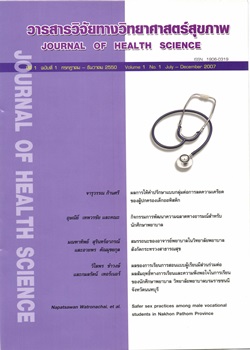กิจกรรมการพัฒนาความฉลาดทางอารมณ์สำหรับนักศึกษาพยาบาล
Main Article Content
บทคัดย่อ
บทคัดย่อ
วัตถุประสงค์ของการวิจัย เพื่อจัดกิจกรรมพัฒนาความฉลาดทางอารมณ์นักศึกษาพยาบาล และศึกษาประสิทธิภาพ ของกิจกรรมพัฒนาความฉลาดทางอารมณ์ที่สร้างขึ้นโดยศึกษาจากผลการประเมินความฉลาดทางอารมณ์ และผลการประเมินความภาคภูมิใจในตนเอง ประชากร คือนักศึกษาพยาบาลทั้งหมดที่เรียนอยู่ในวิทยาลัยพยาบาลบรมราชชนนี ชลบุรี ประจำปีการศึกษา 2547 จำนวน 487 คน ประชากรเป้าหมาย คือนักศึกษาพยาบาลหลักสูตรพยาบาลศาลตรบัณฑิต ชั้นปี 1 จำนวน 101 คน และนักศึกษาพยาบาลหลักสูตรพยาบาลศาลตรบัณฑิต (ต่อเนื่อง) ชั้นปี 3 จำนวน 106 คน สุ่มตัวอย่าง ประชากรด้วยวิธีเจาะจง (Purposive sampling) จำนวน 34 คน เครื่องมือวิจัยมิ 3 อย่างคือ 1. กิจกรรมที่กำหนดขึ้น เพื่อพัฒนาความฉลาดทางอารมณ์ของนักศึกษาพยาบาลเป็นแนวปฏิบัติที่ได้รับการถ่ายทอดจาก นพ.เทอดศักดิ์ เดชคง ได้แก่ การฝึกหายใจ การฝึกประสาทสัมผัส การบันทึกฝึกสังเกตอารมณ์ การบันทึกฝึกมองโลกในด้านดี การบันทึกฝึกตั้ง เป้าหมาย การเข้ากลุ่มวิเคราะห์และวิพากษ์ 2. แบบประเมินความฉลาดทางอารมณ์ ของกรมสุขภาพจิต มิค่าความเชื่อมั่น 0.82 3. แบบประเมินความภาคภูมิใจในตนเอง โดยใช้ Culture-Free Self Esteem Inventories (CFSEI-2) ของ Battle มิค่าความเชื่อมั่น 0.71 ใช้เวลาเตรียมอาจารย์ผู้ช่วยวิจัยเป็นเวลา 8 สัปดาห์ และใช้เวลาทดลองและเก็บรวบรวมข้อมูล 8 สัปดาห์ วิเคราะห์ข้อมูลโดยใช้โปรแกรม SPSS ทดสอบหาความแตกต่างระหว่างค่าเฉลี่ยความฉลาดทางอารมณ์ ด้วยสถิติ t-test
ผลการวิจัย พบว่า 1. นักศึกษาพยาบาลทั้ง 2 หลักสูตร มีคะแนนประเมินความฉลาดทางอารมณ์ ทุกองค์ประกอบ คือดี เก่ง และสุข หลังทำกิจกรรมพัฒนาความฉลาดทางอารมณ์สูงกว่าก่อนทำกิจกรรม และมีความแตกต่างกันอย่างมินัย สำคัญที่ระดับ .05 2. นักศึกษาพยาบาลทั้ง 2 หลักสูตร มิคะแนนประเมินความภาคภูมิใจในตนเอง หลังทำกิจกรรมพัฒนา
ความฉลาดทางอารมณ์สูงกว่าก่อนทำกิจกรรม และแตกต่างกันอย่างมินัยสำคัญที่ระดับ .05
Abstract
The purposes of the research were to conduct activities to help developing emotional quotient (Ea) ofnursing students and to study effectiveness of the activities through the EQ and self-confidence assessment.
The sample group came from the entire student body of BCN Chon Buri in the academic year of 2004with the number of 487 persons. The target samples were 101 first-year undergraduate nursing students and106 third-year graduate students. Thirty four of the samples were selected by purposive sampling method.There were 3 research tools: ('1) the designed activities for developing EQ of nursing students, developed fromTerdsak Dejkong, MD., including breathing practice, sensing practice, emotion-observing practice, optimisticthinking practice, objective oriented thinking, and group analysis and discussion, (2) EQ evaluation form ofDepartment of Mental Health (reliability 0.82), and (3) Self esteem evaluation form by Battle's Culture-Free SelfEsteem Inventories (CFSEI-2Xreliability 0.71 ).
The research required B weeks of the preparation on research assistants and another B weeks for conductingthe activities and collecting data. The software used in the analysis was SPSS with t-test deviation testingmethod.
The research results included :
1. The group of first-year undergraduate nursing students and third-year graduate nursing students hadhigher EQ scores in all 3 components (goodness, intelligence, and happiness) after participated in the activitieswith 5 percent significant level.
2.The group of first-year undergraduate nursing student and third-year graduate nursing students hadhigher self esteem scores after participated in the activities with 5 percent significant level.
Article Details
บทความที่ได้รับการตีพิมพ์เป็นลิขสิทธิ์ของวิทยาลัยพยาบาลบรมราชชนนี จังหวัดนนทบุรี
ข้อความที่ปรากฏในบทความแต่ละเรื่องในวารสารวิชาการเล่มนี้เป็นความคิดเห็นส่วนตัวของผู้เขียนแต่ละท่านไม่เกี่ยวข้องกับวิทยาลัยพยาบาลบรมราชชนนี จังหวัดนนทบุรี และคณาจารย์ท่านอื่น ในวิทยาลัยฯ แต่อย่างใด ความรับผิดชอบองค์ประกอบทั้งหมดของบทความแต่ละเรื่องเป็นของผู้เขียนแต่ละท่าน หากมีความผิดพลาดใด ๆ ผู้เขียนแต่ละท่านจะรับผิดชอบบทความของตนเองแต่ผู้เดียว

